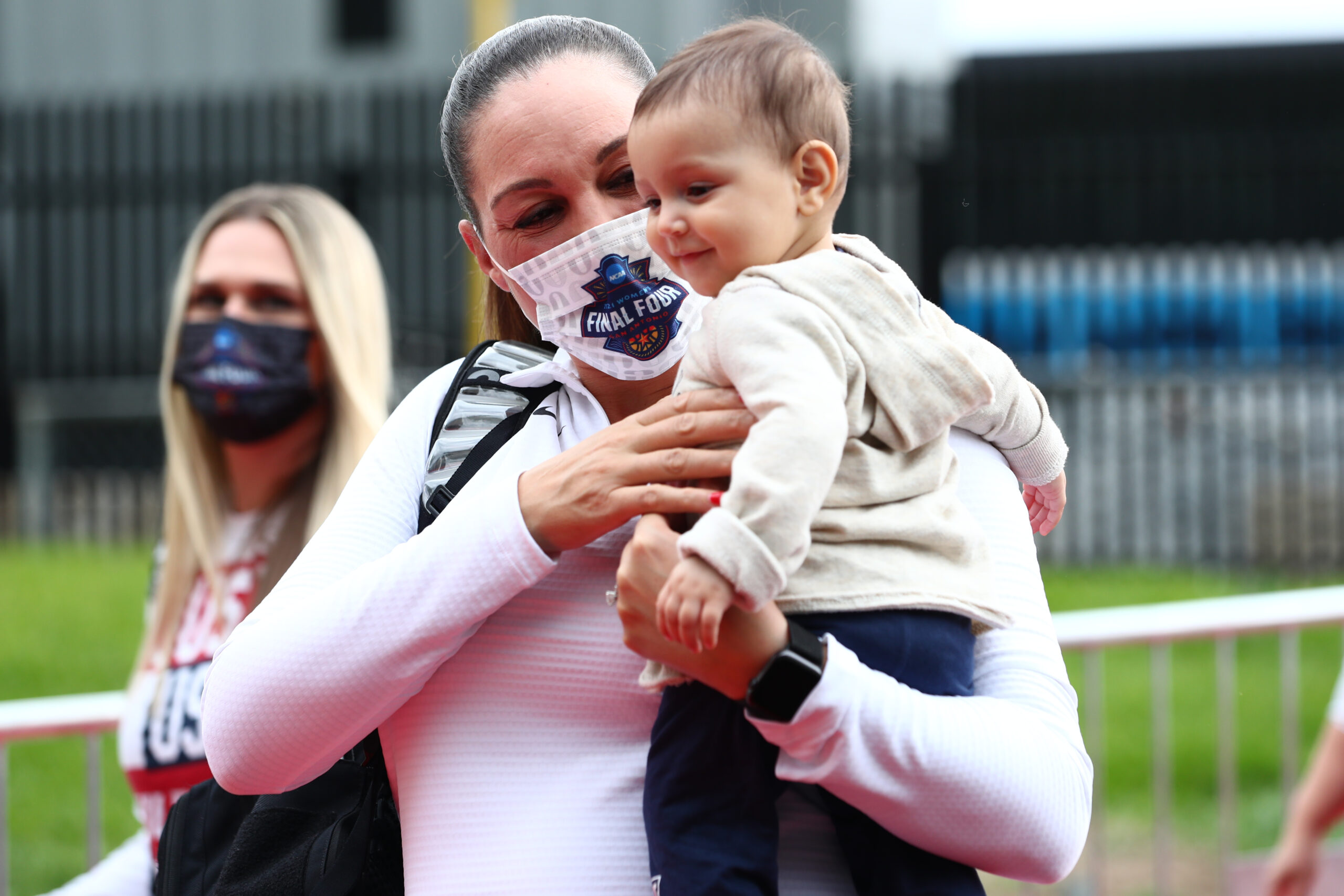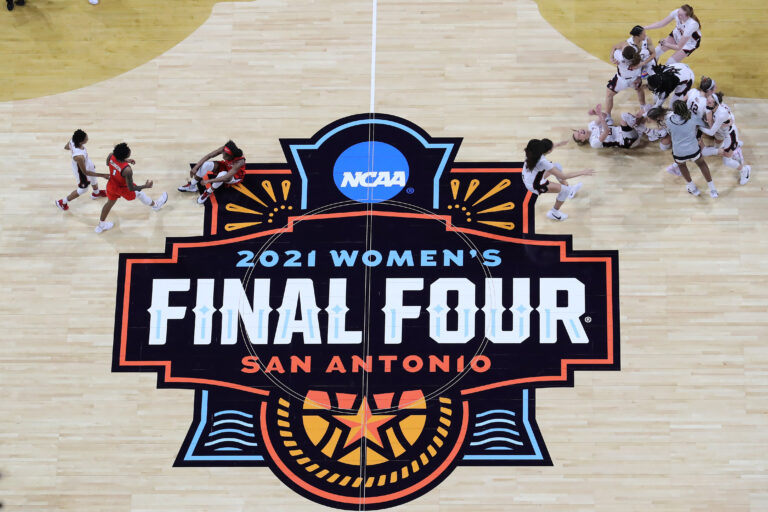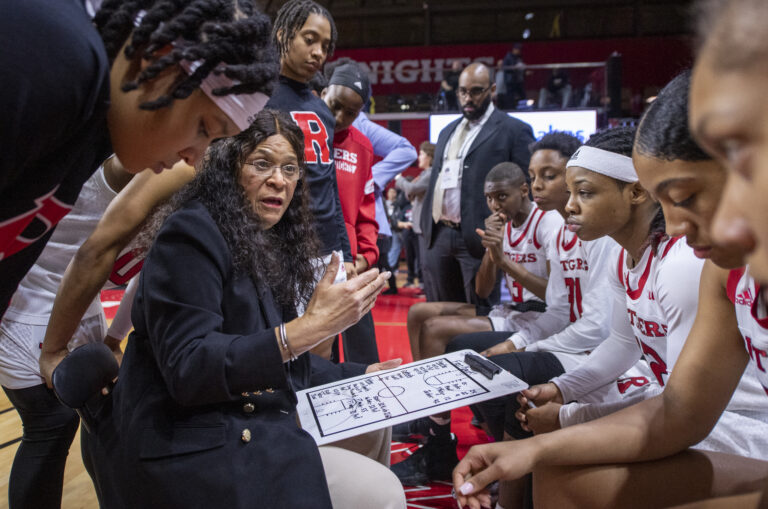Women Coaches Face Greater Professional and Personal Obstacles Than Men
Why this matters
Since the implementation of Title IX, the number of girls and women who play sports has gone up -- but the proportion of women coaches in college sports has decreased. Why? Decades of research show that women coaches face numerous and intertwined career barriers that do not impact men, including a false but prevalent narrative that pregnancy, childcare, and family responsibilities will impede their success.
Last spring, the University of Arizona women’s basketball team surprised the college sports world by reaching the Final Four as an unheralded No. 3 seed. The team’s outspoken and locally beloved coach, Adia Barnes, earned praise for guiding her program to big wins ahead of schedule. But by speaking up about the juggling act she was facing as a mother and coach, Barnes became an even bigger phenomenon.
As Barnes trailed her team back to the court at halftime of the championship game, ESPN reporter Holly Rowe inquired about the coach’s delay coming back to the floor. Barnes responded honestly: She had been breastfeeding her daughter, Capri, in the locker room.
“For those of you who think this is too much information,” Barnes said on ESPN’s broadcast, “let’s normalize working mothers and all they have to do.”
The proportion of women coaches in sport has gone down since the implementation of Title IX, and the reasons are complex. With a record number of girls and women who play sports and possess knowledge and passion for them, how is it possible that fewer women are coaching? Based on the data over decades, it is abundantly clear women sport coaches face numerous and intertwined barriers that impede, influence, and impact their entry into and desire to remain in coaching. These barriers range from individual to interpersonal and from organizational to societal. They include prejudice, stereotypes, and discrimination like sexism and homophobia, all of which multiply for women of color, women with differently abled bodies, and women with children. Indeed, mother-coaches hold their own unique position in the paradoxical world in which we live – and within sport in particular.
So many women are made to believe they can’t have a career in coaching and have a family. They are told, over and over, a false and damaging narrative that having children will impede their success as coaches. Unfortunately, many young women internalize this message and either never enter the field or quit coaching around the time they want to start a family. They feel forced to choose between two life goals they care deeply about –career and motherhood.
But women with children can – and do – successfully coach sports at all levels. We just rarely see or hear from them, which makes the coverage and visibility of Barnes in her team’s run to the 2021 Final Four even more remarkable. Barnes helped to normalize a commonplace and natural act by opening up about her personal experience with it on a national stage.
Women Coaches and the Work-Family Conflict
At the Tucker Center, we study women in sport, including women coaches. Our studies show a sharp decline of women in sport coaching as they move from the NCAA Division I assistant to head coach position, which typically corresponds to a life stage of starting a family and getting married from 28 to 32 years old. Some assistants move “up” into head coach positions around age 27, but in recent years, many have dropped out of coaching altogether.
A picture tells the story: The same precipitous decline is not evident for men who begin to outnumber women in precisely this same critical developmental window. (See Figure 3.)
In all professions, the focus on work-family conflict is strongly gendered and “viewed largely as a women’s issue.” Sport coaching is no exception – despite the fact work-family conflict exists for all parents, regardless of gender. Scholars assert that the coaching culture is so strongly embedded within societal values and norms that many mothers fail to question the status quo and instead attempt to work within it as best they can (Bruening & Dixon, 2007). Some succeed; many do not.
Vocational data also indicates women’s careers develop differently compared to those of men, due to the experiences of many (but not all) women – such as pregnancy, childcare, and family responsibilities – which become problematized due to incompatibility with male work models in an occupational landscape that is led by men, dominated by men, and created by men for men. In sport coaching, all of this restrains women’s development and advancement.
Mother-coaches fall victim to stigma in numerous ways that I categorize as blame-the-women narratives. Women are often faulted for the under-representation of women in coaching, which serves the purpose of keeping in place the broken status quo system that doesn’t support or value women. Interestingly, the blame game is gendered! Male athletic directors (ADs) attribute the under-representation of women coaches to women (that is, women don’t apply for jobs, aren’t interested in coaching, or aren’t qualified), while female athletic leaders attribute it to systemic and institutional factors such as the success of the “Old Boys’ Network” or discrimination in the hiring process. These patterns have remained remarkably similar over decades.
Our recent data shows that men and women ADs across NCAA D-I and III agreed and attributed the top two reasons for under-representation as: 1) time constraints due to family obligations, and 2) female coaches being less likely to move family for coaching positions. Again, these are blaming-the-women narratives. Family is integral to how women coaches make decisions and are perceived by their peers, but the intersecting layers of coaches’ identities set apart how they are able to move forward in their careers or be their true selves in the workplace.
The ‘Mommy Penalty’ and Intersectionality in Women Coaches’ Identities
Mother-coaches thrive despite incurring the “Mommy Penalty,” a term coined by sociologists to explain the workplace phenomenon that working mothers encounter, including biological and cultural based disadvantages in pay, perceived competence, and benefits relative to childless women. When women become pregnant, sociologists have found, they are immediately perceived to be less committed and less competent.
In our data, women head coaches of women’s NCAA D-I teams were half as likely (14%) compared to men (30%) to explicitly mention children in their biographies. One coach from Kamphoff’s 2013 study stated:
“I remember [the AD] telling me, ‘You know, I often wondered how you could juggle being a wife, and having two kids.’ When he said that to me, I’m like that’s in your head, that’s what you’re thinking every time you look at me. Are you kidding me? He wouldn’t say that to a man.”
The penalty, which we do not see for fathers, is applied differently based on a woman’s intersectional identities. For example, oftentimes having children is held out, unconsciously or sometimes intentionally, as a symbol of one’s heterosexuality, traditional family values, and proof that one is not a lesbian. Children are a form of social capital.
However, with gay marriage now legalized, increasing numbers of non-heterosexual women and their partners are formalizing their relationships, having children, and starting families. For some gay, queer, or non-binary women, having children presents an uncomfortable dilemma. On one hand, they want to celebrate, recognize, and normalize their families. Conversely, due to well-documented institutionalized homophobia in sports and in basketball in particular, many women do not want to subject themselves to negative recruiting, scrutiny, discrimination, or backlash or to jeopardize their careers by outing themselves due to becoming wives and mothers.
One tangible way homophobia and heteronormativity manifest is within online coaching biographies. Nearly all coaches have an online presence in the form of a university-sanctioned biography, and a majority of biographies have what we call a family narrative, which typically resides at the bottom of the page.
For example Coach Barnes’ family narrative reads:
“A native of San Diego, Calif., Barnes is married to Salvo Coppa, who coached for 14 seasons prior to arriving at Arizona. … She is also the mother of one son, Matteo, and one daughter, Capri.”
At the Tucker Center, we’ve conducted two studies 10 years apart (2011 and 2021) that show nearly all head coach family narratives recognize a heterosexual family structure. In our most recent data, very few (18 of 3,518, or 0.5%) NCAA D-I head coaches of women’s teams recognized a same-gender partner in their biography. All 18 were women. The key takeaway? What is communicated in a bio reflects who and what is valued – as well as the institutional occupational culture.
The women we have interviewed describe experiencing various forms of homophobia in their career pathways to becoming head coaches. For example, one coach stated:
“I remember when we got married, [my head coach] called me and was upset with me and said that we would lose recruits over it. Named a specific recruit, who said she probably wouldn’t come here and play if she knew I was gay, and just all this stuff and that she didn’t want me to tell the team. It was awful.”
Another coach stated:
“And I got tired of not being here for my partner. She had to be a ghost. She was Casper. When I had recruits over, she had to leave her own home. And when they left, I would call her and I would say, ‘You can come home.’ That’s no life. That’s not fair. So, it was time that I understood and I paid attention to that part of my life too. And I needed better balance and I needed a life, basically.”
Yet despite the prevalent climate of homophobia, these coaches wanted to be out in their biographies to live authentically, be role models, and promote social justice, inclusivity, and fairness. After all, their same-gender colleagues were afforded a family narrative. As one coach told us:
“I thought it was important. I think I saw male coaches put up on their bios who their family was … I was just like, oh, no one’s ever asked me about my family. Why wasn’t that afforded to me and my family? Why isn’t that an option?”
Race also plays a major role in how women move as head coaches and how they are perceived by their peers. Data from our 2020-21 Report Card indicated that a small percentage of NCAA D-I coaches (6.7 percent) were women of color, and 30 percent of those women coached basketball. Women coaches of color experience isolation, scrutiny, and wage inequality, and they often get boxed into roles that limit career advancement and career longevity. They also often feel the need to hide identities or portray a “proper image” to fit into the culture of collegiate coaching. Unfortunately, very little, if any, research exists that explicates how race and gender and the mommy penalty intersect to impact the experiences and career trajectory of women coaches of color.
Black women assistant basketball coaches in Larsen’s 2019 study report reported multiple oppressions. One stated:
“African American coaches, females, a lot of the time don’t get leeway that Caucasian males and women get, so the pressure is on that you have to go and you have to do well and you have to represent well because you are getting watched.”
Based on Larsen’s data, the report states it is clear that “gendered racism is prevalent in NCAA Division I women’s basketball and can have deleterious effects on the psychological health and the career ambitions of Black female assistant coaches.”
This reveals three key points:
- Women can coach at the highest level and have a family.
- More institutional, familial and societal support is needed to support coaching mothers.
- Research specific to the experiences, outcomes, and career trajectories of mother-coaches with various intersectional identities is needed.
Representation and inclusion of women coaches of all identities in women’s basketball, the most popular and visible college sport, matters. Unfortunately, we have a long way to go to realize this reality, which makes it even more important to celebrate and make visible the remarkable success of Coach Barnes.
Supporting Women, Shifting Narratives
As a result of these intersecting social pressures, women coaches themselves frequently cite family obligations as a barrier to career success. That needs to change. And change can begin with shifting the false and negative narratives around women, children, family, and coaching – something that will benefit not only women but all coaching parents:
Falsehood 1: Women ‘opt out’ and choose not to coach. It is important to remember that women coaches make choices within a system and society that doesn’t value or support them. Women bear the majority of domestic and childrearing tasks in families, and that is true of heterosexual and lesbian couples as well as single mothers. A gendered work gap in and outside the home exists and has grown dramatically during the COVID-19 pandemic.
Falsehood 2: Women don’t apply for open coaching jobs. This happens not because they aren’t interested or qualified, but in part because they know that decision-makers will likely hire someone in their networks. A majority of ADs are white men, and most of the time they will hire someone who looks like them. The “Old Boys’ Club” in college athletics is alive and well, and women are well aware of it. In the Tucker Center’s Women in College Coaching Report Card, we saw that over 10 years, a majority (57.5 percent) of head coach hires for women’s sports teams at the NCAA D-I level were men hired by men. In addition, one quarter of NCAA D-I women’s teams have zero women on the coaching staff. Imagine if 25 percent of the men's teams had all-women coaching staffs!
Falsehood 3: Women aren’t interested in coaching. Women are interested in coaching – despite the fact they encounter gender bias and numerous other barriers, hardly see coaches who look like them, and seldom were coached by women themselves. They are interested despite cultural messages which communicate that men are more suited and competent. Women are qualified and competent, but they often are not given the opportunity to prove it. When they do, they shine. Consider the rise of women assistant coaches in the National Basketball Association since 2012, when Becky Hammon was given a highly visible opportunity with the San Antonio Spurs.
Falsehood 4: Women don’t want to move their families for coaching jobs. No empirical data exists to support this contention. It is simply not known if women are more or less likely to move for coaching jobs than men – and few have asked women why they don’t take jobs they are offered. It may be true that women coaches don’t want to uproot their families for jobs that are not inherently stable, but this is likely true for men as well.
In addition, it’s possible and even probable that a female coaching candidate who doesn’t want to move has good familial, community, and institutional support in place to help her balance motherhood, family obligations, and coaching. Some women coaches in Dixon and Bruening’s research on work-family balance among coaches reported they worked and lived near family, which provided a strong support and coping mechanism that helped to reduce work-family conflict. A majority of the women coaches we’ve interviewed cited having a supportive partner at home. More often than not, the partner was or had been in sport or a coaching role and thus understood the demands and commitments of coaching – as well as the passion it took to pursue coaching as a career pathway.
Organizational leaders can help support women by constructing family-friendly environments, promoting a culture of work-life balance, discouraging coaches from being 24/7 accessible and encouraging self-care, providing support for young parents and nursing mothers during practice and competitions, allowing partners and young children to travel with the team at no extra cost, and allowing flexible work arrangements.
Falsehood 5: Women can’t coach and have children. Women do coach and have kids despite traditional gender expectations toward what a woman is supposed to do or not do in regards to family and work. This impacts women disproportionately, creating feelings of shame, guilt and burnout that are not as prevalent among men in the same situation. Some women persist, report work-family enrichment, and succeed despite the focus on performance measures and a gendered system that discriminates against them.
Beyond Adia Barnes
When young girls and women see same-identity individuals in coaching roles, they experience positive self-perceptions, are motivated and inspired, and are more likely to believe that coaching is a legitimate career path. Our data shows that when women are coached by women, they are more likely to stay in coaching. The presence of women in leadership roles can also profoundly influence men. By interviewing male practice players for D-I women’s basketball, we discovered that when young men experience and compete against competent women, particularly in a context like sport that has high relevance for them, they are more likely to respect, value, and see women as their equals.
These are positive outcomes! And they show that resources are needed at all levels of the system to help women of various intersectional identities – race, gender, sexual orientation, motherhood, age, religion, ability – enter into, develop, and progress within and across sport coaching careers.
In spite of the barriers she continues to face, Barnes, a Black woman mother-coach, succeeded as a leader for her team and as an exemplar for how to balance motherhood and coaching. Girls and women rarely have role models available to them, giving them fewer examples to show that success is attainable. Still, Barnes’ accomplishments should not be taken as proof that sexism, racism and homophobia are passé in women’s basketball. Take it from Barnes: Let’s normalize mother-coaches and women of all identities who coach.
As women’s sport continues to grow and women across industry fight for equity and fair treatment, what sport can do for Barnes and others like her is to ensure they are valued and supported doing something they love, both for their sake and the sake of the next generation of young women who see themselves in Barnes and her counterparts.
Monthly Issue
Taking Charge in Women's Basketball
Across the world, basketball is relatively unique among team sports with the volume of women who play and coach in its ranks. Still, trends in the sport’s leadership don’t accurately reflect the athletes who put in the work each day on the court.
While a diverse crop of head coaches at HBCUs has not created a pipeline to the Power Five, new momentum behind women’s sports has helped carry women’s basketball to new heights. Can an exciting, outspoken generation of leaders in the sport turn it into a more equitable and popular avenue for women to thrive as leaders and athletes?








